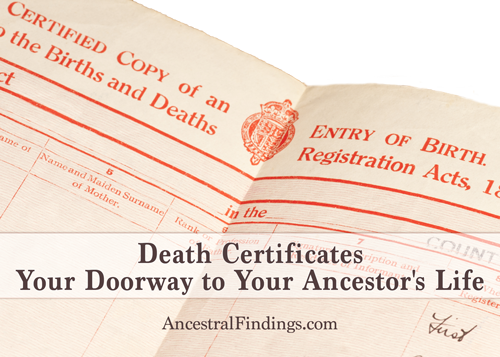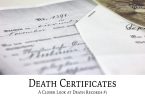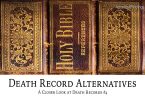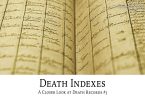Using death records is a basic part of genealogy research. In fact, for many genealogists, it is the first type of record set they learn to use. This is because death records are readily available to the general public in most cases and because they usually contain a wealth of important family history information. If you haven’t yet learned how to use death records in your genealogy research and don’t know what they can offer you, here’s what you need to know to get started with them.
How to Get Death Records
Getting death records depends on when and where the records were generated. Most states did not require death records to be kept until the mid-19th century to the early 20th century. If the record you want falls within this time period, you can usually find it at the state department of vital records, available for a fee (the fees vary from state to state). New England kept birth, death, and marriage records from the colonial times, so if you need an earlier record there, you can usually find it at the town hall of the town in which the death took place, or in one of the many published books of colonial New England vital records that are available at the genealogical departments of libraries and at historical societies. AmericanAncestors.org, a paid membership site for New England research, also has these records. In other states, you may have to rely on family Bible records or even headstone information to get a record of a death that occurred earlier than the mid-1800s.
Most states make the death records held at the department of vital statistics available to the public. A few states will make you prove your relationship to the deceased first or will require you to wait a certain number of decades after the death to get the record. These are the exceptions rather than the rules, though. Most states will send a death record to anyone who asks for it.
What Information is Found in Death Records
Very early death records may just have the name, age, and death date of the deceased. Sometimes, parents’ names are included, but not always. Later death records have a lot more information available on them. You can find such things as:
- Full name of the deceased
- Maiden name (if a married woman)
- Name of the spouse (if married)
- Birthdate or age in years, months, and days (so you can figure out the birth date)
- Date and place of death
- Names and birthplaces of parents
- Cause of death and duration of that cause
- The name of the attending doctor and when the doctor last saw that person alive
- The name of the person who provided the information for the death certificate (often a relative, but not always)
- Whether the remains were buried, cremated, or disposed of in some other way)
- The name of the cemetery in which the remains were buried and the date of burial (you can use this information to visit the cemetery and see the headstone if there is one)
Using death records can give you a wealth of information on your deceased ancestor. A lot of this information may be new to you, such as the birth date or the names and birthplaces of the parents. The information can also give you jumping off points to do further research into that ancestor or their family. Start using death records in your genealogy research today and see what treasures you discover.
- State Records (Free Lookups)
- Death Records (Free Lookups)






